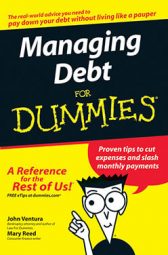Not paying unsecured debts can result in loss of assets. If you cut your budget to the bare bones and still can’t pay all your debts and living expenses, you have to decide what you will pay. Unsecured debts that deserve priority treatment include:
Child support, especially if it’s court ordered. If your child support order was written after December 31, 2003, and you are employed, your child support payments can automatically be deducted from your paycheck.
Federal income taxes. Uncle Sam has almost unlimited powers to collect past-due tax debts.
State income taxes. If you don’t pay these taxes, your state can sue you, garnish your wages, or seize your property.
Property taxes and homeowner’s insurance, if these expenses aren’t included in your mortgage payments. When you don’t pay your property taxes, the taxing authority will eventually take your home. If your homeowner’s insurance gets cancelled for nonpayment, your lender will buy insurance for you, but the insurance will be very expensive, so the total amount of your monthly mortgage payments will increase.
Federal student loans. The IRS can collect what you owe when you fall behind on your federally guaranteed student loans.
Your health insurance, if you’re responsible for the payments. Keeping up with your health insurance is especially important if you or a family member has an ongoing health problem. Without insurance, an expensive illness or accident could push you into bankruptcy.
Medical bills. A growing number of healthcare providers, including hospitals, are getting aggressive about collecting on their patients’ past-due accounts, even suing patients in some instances. If you owe money to a healthcare provider, contact the provider to try to work out a plan for paying what you owe.

